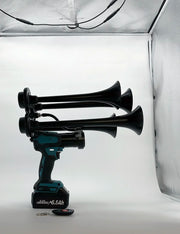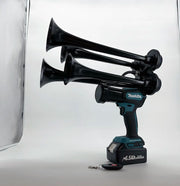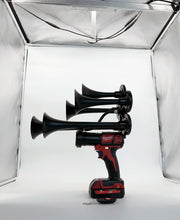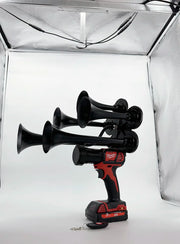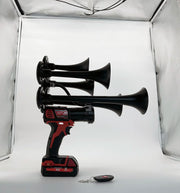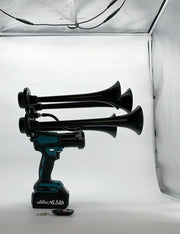A unique, buzzing sound that has been known to simultaneously irritate and captivate the world, the vuvuzela horn has become synonymous with passion and fanaticism in the world of sports. It has a deep-rooted history that dates back centuries and continues to be a significant part of cultural celebrations today. Used primarily in South Africa, where it originated, this instrument has become a powerful symbol of unity and national pride.
The vuvuzela horn traces its roots back to the tribal communities of South Africa, where it was initially crafted from simple natural materials. These early versions were primarily used for communication and signaling during traditional ceremonies and rituals. However, as time went on, the vuvuzela evolved in both design and purpose, finding its place as a musical instrument and a symbol of support during sporting events.
Today, the vuvuzela horn has become an integral part of the South African fan culture, particularly in soccer matches. Its piercing sound creates an electrifying atmosphere, ensuring that fans' voices are heard and their passion felt throughout the stadium. The tradition of blowing the vuvuzela horn has even spread to other parts of the world, where it has been adopted by sports enthusiasts looking to bring the same level of excitement and energy to their own events.
In recent years, the vuvuzela has faced its fair share of controversy. Some argue that its loud and monotonous drone disrupts the game's flow and detracts from the overall fan experience. However, proponents of the vuvuzela argue that it has become an essential part of the sporting culture in South Africa and should be embraced for its role in fostering a sense of community and togetherness.
As the vuvuzela horn continues to be used in stadiums around the world, its impact on the overall fan experience cannot be ignored. According to a survey conducted during the 2010 FIFA World Cup in South Africa, a staggering 89% of attendees reported that the vuvuzela added excitement and atmosphere to the matches. This statistic clearly demonstrates the power and significance that this instrument holds, not only for South Africans but for fans everywhere.
In conclusion, the vuvuzela horn's origin can be traced back to the tribal communities of South Africa, where it was originally used for communication and signaling. Over time, it evolved into a symbol of support and unity during sporting events, particularly in soccer matches. Despite its controversial nature, the vuvuzela has become an inseparable part of fan culture, adding excitement and atmosphere to stadiums worldwide. Its impact on the overall fan experience should not be underestimated, making it a significant element in the world of sports.
The Origin of the Vuvuzela Horn: A Cultural Treasure or a Modern Public Nuisance?
The vuvuzela horn, also known as the "lepatata" in southern Africa, has become synonymous with the spirit and enthusiasm of football matches. Originating from African tribal traditions, these horn-like instruments have been used for centuries in celebratory events. However, their introduction on a global scale during the 2010 FIFA World Cup in South Africa sparked a worldwide debate. Some view the vuvuzela horn as a cultural treasure that adds unique authenticity to the game, while others perceive it as a modern public nuisance that disrupts the overall experience for both players and spectators. In this article, we will delve into the fascinating history and cultural significance of the vuvuzela horn, as well as explore its advantages and drawbacks. By examining both perspectives, we hope to shed light on this controversial instrument and encourage a thoughtful discussion on its impact.
Introduction to the Vuvuzela Horn
The vuvuzela horn has become a well-known symbol of South African football, creating a unique and unmistakable sound that reverberates through stadiums during matches. Most commonly made from plastic, the vuvuzela horn is a long, trumpet-like instrument that has both fascinated and divided football fans around the world.
The Origins of the Vuvuzela Horn
The origins of the vuvuzela horn can be traced back to the townships of South Africa, where it was initially used as a means of celebration and communication. The word "vuvuzela" itself is derived from the Zulu language, with "vu" meaning to make a noise and "vuzela" meaning a stadium horn.
While the vuvuzela has gained global popularity in recent years, its roots can be traced back several decades. Early versions of the instrument were made from various materials, including metal and tin, but it wasn't until the late 20th century that the plastic vuvuzela became ubiquitous in South African football culture.
Rise to Prominence
The vuvuzela horn first gained international attention during the 2009 FIFA Confederations Cup held in South Africa. Its loud and distinctive sound quickly became a defining feature of the tournament, sparking a global debate about its use in football stadiums.
While some fans and players embraced the vuvuzela horn as a unique expression of South African football culture, others criticized it for its constant noise and potential to drown out other sounds in the stadium. The controversy even led to suggestions of banning the instrument from football matches altogether.
The Vuvuzela's Global Impact
Despite the controversy surrounding its use, the vuvuzela horn had a lasting impact on football culture worldwide. Its distinctive sound became synonymous with the 2010 FIFA World Cup held in South Africa, as fans from around the globe embraced the instrument and its role in creating a vibrant and energetic atmosphere in stadiums.
Since then, the vuvuzela horn has made appearances in football matches and sporting events across the world. It has also garnered attention in popular culture, appearing in advertisements, movies, and music videos.
Statistics:
- The longest vuvuzela horn ever recorded measured a staggering 3.13 meters (10.27 feet).
- During the 2010 FIFA World Cup, an estimated 1.5 million vuvuzelas were sold in South Africa.
- The sound produced by a vuvuzela horn can reach up to 127 decibels, equivalent to the noise level of a chainsaw or a rock concert.
- The vuvuzela horn gained widespread popularity not only in football but also in other sporting events, such as rugby and cricket.
- Despite the initial controversy, the vuvuzela horn remains an iconic symbol of South African football culture.
https://youtube.com/watch?v=kW6iBunfhJ0
Frequently Asked Questions about the History of the Vuvuzela
1. What is the story behind the emergence of the vuvuzela?
The emergence of the vuvuzela can be traced back to the origins of a certain cultural tradition. The story behind its emergence lies in the rich history of a community that valued a particular instrument. This instrument, which grew to become the vuvuzela, played a significant role in the cultural practices and celebratory events of this community.
Key information:
- The vuvuzela originated from a specific cultural tradition.
- It evolved from an existing instrument into the vuvuzela.
- The instrument played a significant role in cultural practices and celebratory events.
2. How did the vuvuzela gain popularity beyond its cultural context?
The widespread popularity of the vuvuzela outside its cultural context can be attributed to a particular event that provided global exposure. This event allowed the vuvuzela to capture the attention of people from different parts of the world, leading to its rise in popularity and adoption in various settings.
Key information:
- A specific event played a crucial role in introducing the vuvuzela to a global audience.
- The vuvuzela gained popularity and recognition beyond its cultural boundaries.
- People from different parts of the world became exposed to the vuvuzela through this event.
3. How did the vuvuzela become synonymous with a particular sporting event?
The association between the vuvuzela and a specific sporting event emerged due to a combination of factors. These factors include the cultural significance of the vuvuzela, the ambiance it created in stadiums, and the enthusiastic participation of fans. As a result, the vuvuzela became inseparable from the atmosphere and experience of this particular sport, leading to its iconic status during these events.
Key information:
- The vuvuzela developed a strong association with a particular sporting event.
- The ambiance created by the vuvuzela in stadiums contributed to its iconic status.
- Enthusiastic fan participation further solidified the vuvuzela's connection to this sport.
4. Why did the use of the vuvuzela spark controversy during international competitions?
The use of the vuvuzela in international competitions sparked controversy primarily due to its distinctive sound and the potential impact it had on the overall spectator experience. The continuous loud buzzing sound generated by vuvuzelas created challenges for some viewers and players. This led to debates about the appropriateness of its use in international sporting events and prompted discussions about finding a balance between cultural expression and preserving the integrity of competition.
Key information:
- The distinctive sound of the vuvuzela caused controversy during international competitions.
- Some viewers and players found the continuous buzzing irritating.
- Debates centered around striking a balance between cultural expression and maintaining the quality of the spectator experience.
5. How has the vuvuzela inspired other similar instruments in different parts of the world?
The influence of the vuvuzela has extended beyond its original cultural context, inspiring the creation and adoption of similar instruments in different parts of the world. This phenomenon demonstrates the remarkable impact of the vuvuzela on musical creativity and the desire to emulate its unique sound and celebratory spirit. As a result, various communities have embraced similar instruments, incorporating them into their cultural traditions and festivities.
Key information:
- The vuvuzela has influenced the creation of similar instruments worldwide.
- Other communities have adopted and incorporated these instruments into their own cultural traditions.
- The vuvuzela has left a lasting impact on musical creativity and celebratory expressions globally.
In conclusion, the vuvuzela's emergence from a cultural tradition, its global recognition, association with specific sporting events, controversy surrounding its use, and influence on similar instruments around the world form the fascinating history of this unique horn. Its impact on cultural expressions and musical creativity continues to resonate globally.
Conclusion
The vuvuzela horn, originating in South Africa, has a rich cultural and historical significance. It has been an integral part of South African sports and celebrations for centuries. The vuvuzela horn is believed to have been used traditionally by hunters, communicating over long distances in the wild. Over time, it has evolved to become a popular musical instrument during sporting events, particularly the 2010 FIFA World Cup held in South Africa. Despite generating mixed opinions, the vuvuzela horn continues to be embraced as a symbol of unity, passion, and support for teams. Its distinct sound and lively spirit make it a unique contribution to the world of sports and cultural heritage.















